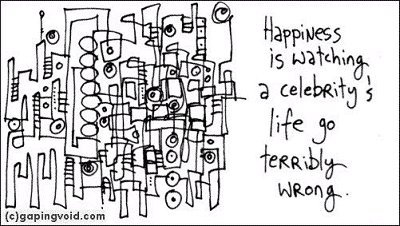Wealth intrigues me. And, it amuses me, because at times I wonder if there’s anything close to “adequate wealth”, or maybe, “good enough to last long” wealth. We are chasing wealth, but it comes with no guarantee of happiness. So I’ve pondered on one of the simplest ways of making wealth. There’s a more complex, but effective, mechanism as well – a must read article on making wealth by Paul Graham.
But, what is wealth? The most common notion is that its to do with money. Some liberated souls relate it to the amont of happiness in one’s life. Other, practical bodies, relate it to the legacy of their life-time – which is to say the memories, the teachings, and the lessons of life – that they’ve passed down to their grand-children. Happiness, is as subjective as wealth itself, and yet they seem co-related. For a lot of people, money can deter worry, and that can add to their happiness.
The Easterlin paradox, proposed by economist Richard Easterlin, is a classic theory which argues that economic growth doesn’t necessarily lead to more satisfaction. This paradox asserts that happiness is not related to the total amount of money you own, but rather to the amount of money you own compared to those around you. Makes sense in all likelihood.
But this month, Easterlin’s paper has had a rebuttal. A new theory, based on research and surveys extending over 30 years since Mr. Easterlin’s study, now claims that money indeed tends to bring happiness, contrary to the original hypothesis. An accompanying map shows a correlation between a country’s GDP per capita income and average life satisfaction. Quite compelling.
So, its still debatable if economic growth, by itself, is enough to guarantee happiness? To obscure things further, a recent research has also found that some of the things that make people happiest – short commutes, time spent with friends – have little to do with higher incomes. But I think this assumption is flawed, because your short commutes can be a result of your housing affordability near your work place, and your time spent with friends can be a result of you already having enough money not to work too hard and stay busy most of the time.
One sure sign of prosperity and happiness, is that economic growth can pay for investments in scientific research that lead to longer, healthier lives.
Maybe, with the cultural penetration of the Internet, TV, and Radio, in the third world nations, the new paradox is simply the fact that information technology has made it obvious to the poor countries how poor they really are. Imagine, being in a small village in Uganda (for example), and watching BBC’s coverage of the Ugandan food crisis. Maybe, this very projection of poverty has made the poorer nations accept their state of being. They are a little happier now, for the world is contemplating their well being. Maybe, the first step toward social happiness is to desist the intake of mainstream media, much like how China does. But then, are Chinese more (or less) happier than Ugandans?
With oil prices soaring, I wonder how much 35.27 ounces of happiness would cost me today.
